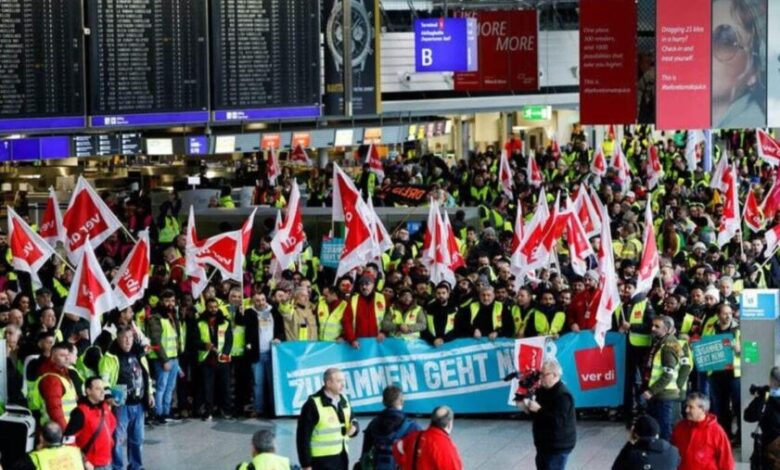Public transport strikes in Europe: what Ukrainians abroad need to know

This autumn, Europe is facing large-scale protests by transport workers. These strikes, driven by demands for better working conditions, higher wages and renegotiation of employment contracts, could seriously affect the lives and movements of millions of people, including Ukrainian refugees in various European countries. Problems in public transport, railways and air travel are already beginning to cause inconvenience, which is expected to continue throughout November and December. The FACT news agency has gathered information about the main countries affected by the strikes and the specifics of each protest.
Causes of mass strikes in the transport sector
The economic situation in Europe, caused by inflation and rising living costs, is forcing transport workers to demand a review of their working conditions and compensation. Insufficient funding for infrastructure, outdated contractual terms and high workloads are putting additional pressure on workers. They are currently trying to draw the attention of governments to the need for changes in labour legislation and increased funding for the sector.
Italy: large-scale protests in November
Strike by public transport workers
A 24-hour strike by public transport workers is scheduled for 8 November in Italy. This action will start at 5:30 am, and only about a third of bus and tram drivers will go to work. According to the unions Filt Cgil, Fit Cisl, Uiltrasporti, Faisa Cisal and Ugl Fna, the main demands are better working conditions, higher wages and a review of labour contracts for transport workers. In addition to stopping public transport, the protesters are planning a rally outside the Ministry of Transport to publicly express their demands.
Air traffic controllers strike
On 12 November, Italian air traffic controllers announced a four-hour strike from 13:00 to 17:00, which could affect the operation of several major airports. This could cause significant flight delays and affect air traffic between the country’s main cities. Refugees and tourists planning to travel through Italian airports during this period are advised to check the status of their flights in advance.
Protests at airports
A strike by baggage handlers and WizzAir employees is scheduled for 29 November at Milan airports. During the same period, on 28-29 November, railway workers will go on strike for 24 hours, which could significantly affect travel across the country.
Netherlands: confrontation between railway workers and ProRail
A conflict is brewing in the Netherlands between the FNV trade union and the railway company ProRail. Railway infrastructure workers are demanding a significant increase in wages, as ProRail’s proposal to raise wages by 5.2% does not meet expectations. According to the union, this proposal does not take into account the rising cost of living and does not provide the necessary financial stability for employees. If the demands are not met, rail workers may go on strike as early as 11 November. This is expected to have a serious impact on the work of dispatchers and key personnel controlling railway traffic, as well as on international rail traffic.
France: strikes in the railway and public transport sectors
In France, transport unions are also putting forward their demands to the government and the heads of transport companies. The main cause of discontent is poor working conditions and low salaries. The unions are calling for a review of collective bargaining agreements, which they believe restrict employees’ rights and could lead to job losses in the transport sector. If the talks fail, strikes are expected to begin in the second half of November, affecting the country’s main railway junctions and national traffic.
UK: transport workers make demands on working conditions
In the UK, rail and airline workers are actively negotiating with the government and employers to improve their working conditions. The country’s rail sector has been under pressure for a long time due to insufficient funding and rising living costs, which has led workers to demand higher wages. New strikes are planned for November, which could lead to serious disruptions in train traffic, particularly on important routes. In addition, aviation workers, including airport and ground handling personnel, may join the protests, demanding a review of their employment contracts and improved working conditions.
Implications of the strikes for Ukrainian refugees and recommendations
For Ukrainian refugees currently in Europe or planning to travel, mass strikes could create serious difficulties. The main possible consequences:
- Flight delays and cancellations. Significant delays are expected on railways and at airports, which may affect travel plans, visits to hospitals or other important places.
- Travel rescheduling. Travelling planned for November and December, especially between major cities, may be difficult for Ukrainians who were hoping for convenient connections. It is recommended to choose alternative travel dates or find other transport options.
- Reduced transport links. Limited bus, tram and train services mean that getting to work or school may be difficult. Ukrainians in Europe should follow local news and announcements from transport companies to keep up to date with current schedules.
- Adapting to schedule changes. As strikes may be repeated or rescheduled, it is recommended to check the status of travel in advance and consider booking alternative routes if possible.
The wave of strikes sweeping Europe is a reflection of wider social tensions over poor working conditions in the transport sector. It is important for Ukrainians abroad to stay informed and plan their travels with possible transport disruptions in mind. Strikes in Italy, the Netherlands, France and the UK could affect the daily lives of many, including refugees from Ukraine, who are already in a difficult situation due to the war. In order to avoid any troubles while travelling, it is worth considering all possible transport options, following the news and being prepared for changes in the schedule.





